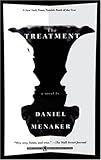The Treatment
The movie The Treatment was based on the book The Treatment.
Movie details for The TreatmentThe movie was released in 2006 and directed by Jim Sharman. The Treatment was produced by 20th Century Fox. More information on the movie is available on Amazon.com and also IMDb. Actors on this movie include Jessica Harper, Cliff De Young, Richard O'Brien, Patricia Quinn, Charles Gray, Ruby Wax, Nell Campbell, Rik Mayall, Barry Humphries, Darlene Johnson, Manning Redwood, Wendy Raebeck, Jeremy Newson, Betsy Brantley, Perry Bedden, Rufus Collins, Christopher Malcolm, Ray Charleson, Eugene Lipinski and Barry Dennen. |
 |
Book details for The TreatmentThe Treatment was written by Daniel Menaker. The book was published in 1998 by Pocket. More information on the book is available on Amazon.com. |
 |
Though Dr. Morales is dead-on about his patient's inertia, his antic method gives the term critical care (not to mention shrink wrap) new meaning. Indeed, Jake and his doctor's hostilities are both hilarious and deeply painful, skidding between progress and "emotional vivisection." Is the foul-mouthed, foul-minded Morales a sport of psychiatric nature, or is he on the right track? Neither patient nor reader will ever be quite sure, though Jake does come out of his long slump, inheriting the responsibility for his own life--and those of several others.
The Treatment ruffles with comic energy and risky shifts, but also with something increasingly rare in fiction--tenderness. Menaker, unlike his protagonist, seems unafraid of emotion and has a perfect ear for the momentary exchange that simultaneously reveals and conceals all. He can also dish up epigrams with the best of them. Jake turns Wallace Stevens's hieratic pronunciamento into a surprising home truth: "If death is in fact the mother of beauty, she never spends any time with her kids." Any reader interested in the fresh pleasures of language, character, and sharp social landscaping should look no further. The Treatment is both a merry novel about loss and a melancholy fiction about the pleasures of intimacy--sexual, familial, and, of course, therapeutic.